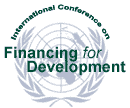
Department of Public Information - News and Media Services Division - New York
18-22 March 2002
19 March 2002
 |
International
Conference on Financing for Development Department of Public Information - News and Media Services Division - New York |
|
| Monterrey, NL, Mexico 18-22 March 2002 |
19 March 2002 |
|
NGO PRESS CONFERENCE
"Civil Society must be involved in the entire process of financing for development, Leonor Briones, Economic Adviser, Social Watch Asia, said at a press conference this evening entitled "Partnerships -- a civil society view on today's round table".
Partnership required participation, she said. It should be based on trust and should be democratic. Civil society should be involved in strategy-making, as well as in the accounting of financial resources. While civil society was included as a matter of ritual in financing for development negotiations, their views were not actually reflected in the final decisions.
Also participating in the press conference, which was sponsored by Sweden, were Marilyn Clement, Executive Secretary, United Methodist Church; Sister Helene O'Sullivan, Maryknoll Sisters of St. Dominic; Paul Nehru Tennassee, Director, World Confederation of Labour; and Lena Westerlund, Senior International Economist, Swedish Trade Union Confederation/International Confederation of Trade Unions.
Ms. Clement noted that people from the developed countries often didn't know how little aid was given. Some $128 million a day went from the poorest countries to the richest countries, who didn't need it. She had called on the United States during the round tables to meet the goal of 0.7 per cent official development assistance (ODA) and to cancel the debt of developing countries. She underlined the importance of making women partners in the development process.
Ms. O'Sullivan said her organization had stressed the role of rural agricultural communities and women as partners in development. They had also stressed the importance of addressing the problems facing least developed countries. The sisters of her orders had seen both the devastation facing citizens of those countries, as well as their resilience. There were whole new models for developments being introduced. Those who had taken advantage of them should be brought to the table as partners for development. If women and local communities were included, there would be a positive systemic effect. Her organization supported the rights of the world's poorest people. She called for unequivocal financial support for the poorest of the poor.
Mr. Tennassee said the Confederation had made a number of demands, including that the dialogue with multilateral institutions be redefined through negotiations with labour and civil society partners. It had also demanded that multilateral institutions allocate financial resources in a global fund to facilitate partnerships to help follow-up on United Nations conferences. Civil society was an important stakeholder and should not be left out.
Ms. Westerlund, Senior International Economist, Swedish Trade Union Confederation/International Confederation of Trade Unions, said her organization represented 160 million workers worldwide. Social partnerships between trade unions and employers had been emphasized. Trade unions as partners were often harassed, and their rights not respected, so she had attempted to make the case that trade union rights were also human rights. Collective bargaining agreements could help to reduce poverty, wage and income gaps, she said.
A correspondent asked Ms. Briones about the impact of ODA increases in Asia. She said ODA included loans, as well as grants. Conditionalities were often attached to ODA. The developing countries, whether in Asia or elsewhere, must be careful and look at the additional ODA in terms of their own needs and interests.
Press Conferences
Conference News